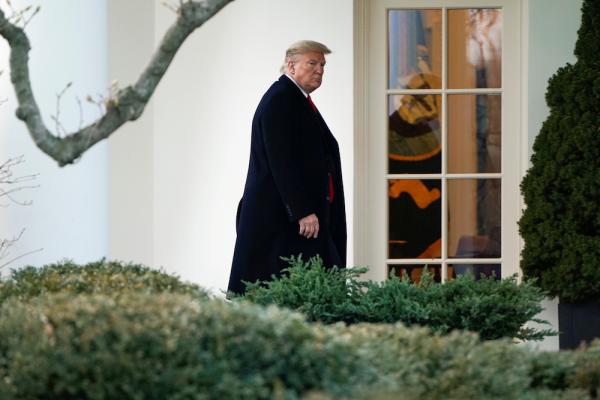Sojourners was among the first to say the oft-repeated refrain that a budget is a moral document. Of course, that’s still true. Whether for a single household, an organization, or an entire nation, a budget offers a sense of the moral values of the people who create it. It shows who and what do and do not matter — what the priorities are — for the family or church or Congress or the White House.
When a president releases his annual budget proposal, there’s always a temptation to argue that it carries little weight — that since Congress holds the power of the purse, many of the president’s proposals may be non-starters for the opposing party and won’t actually go into effect. That’s why it’s helpful to view President Trump’s budget proposal for FY2021, which was released on Monday, not as a preview of what’s to come, but instead as a statement of purpose and priority — literally, a campaign document.
As the Washington Post details, the budget would “cut Medicaid and the Children’s Health Insurance Program and also wring savings from Medicare despite Trump’s repeated promises to safeguard Medicare and Social Security.” (This, in direct contradiction to a tweet he sent just last Saturday vowing, “We will not be touching your Social Security and Medicare in Fiscal 2021 Budget.”) Trump’s proposal also slashes the budgets of agencies charged with protecting creation and vulnerable people, like the Environmental Protection Agency, Health and Human Services, Housing and Urban Development, and the U.S. Agency for International Development. In sharp contrast, the Homeland Security and Defense budgets would remain stable or see increases, and the tax cuts for the wealthy enacted in 2017 would be made permanent. As Bob Greenstein of the Center for Budget and Policy Priorities points out, “expenditures for non-defense discretionary programs, measured as a share of the economy (GDP), would reach their lowest level since Calvin Coolidge was President in the 1920s.” Trump is explicitly stating his funding priorities and setting up a contrast between how he would allocate taxpayer money and how the contenders for the Democratic nomination would do so.
Again, this budget document should not be viewed as policy. It’s Trump’s statement of what he would do with the government if he could act unilaterally — and the picture it gives of his priorities and moral choices is grotesque. That statement should tell us something about what Trump can do, and has been doing, when he doesn’t have to go through Congress. It’s clear that the Trump administration responded to its party’s defeat in the 2018 midterm elections not by moderating its push to inflict harm on society’s most vulnerable, but rather by simply shifting its tactics to focus less on legislation and more on executive orders, which far more often fly under the media’s radar. The administration has been using every bit of executive authority it can justify, and then some, to make the lives of people more difficult and less secure. As I wrote last fall:
The administration’s clearest goals take the form of adding new requirements and regulations to programs that benefit vulnerable people in order to slash the number of people on them, cutting aid to families with food insecurity, reducing enrollment in and preventing the further expansion of Medicaid — the program that provides health care coverage to low-income Americans — and spreading fear among immigrants from receiving any needed public assistance even for limited periods of time.
Thanks to the tireless work of many of our friends, activists, and allied organizations, a clear picture has emerged in recent months of both what the Trump administration is trying to do through executive action and how it is trying to do it. For that reason, the Circle of Protection — a group of leaders from all the families of U.S. Christianity, formed in 2011 to protect government programs that serve poor and hungry people, both in the United States and around the world — released a letter yesterday in opposition to ongoing administration actions to cut safety net programs that practically and effectively help low-income people.
The gospel of God’s love for all people moves us to speak together on this issue … some of the administration’s policy changes and proposed cuts in funding for low-income programs are likely to add to the hunger, poverty, and economic insecurity which are already far too widespread in our country … The administration has also restricted opportunities and protection for immigrants, refugees and people of color in other ways, and our nation has neglected humanitarian concerns in other parts of the world … We can do better. Jesus taught that the peoples of the world will be judged by what we do for the hungry, the stranger, the sick, and the prisoner (Matthew 25:31-46).
The Circle of Protection represents church bodies and networks that serve more than 100 million Americans, and it’s not a small thing that organizations from Sojourners to the National Association of Evangelicals have been speaking with one voice to protect programs that serve poor and hungry people from harmful budget cuts for almost a decade now — efforts that so far have been largely successful in protecting these vital programs. It’s a group that can speak with deep and broad moral authority against these ongoing assaults and threats to those Jesus specifically commands us to protect.
Fortunately, the courts have so far stymied several of the administration’s harmful executive actions taken to erode safety net programs, ruling that some of these changes are incompatible with the way the laws authorizing the programs are written. And yet, the administration is appealing the court decisions that have gone against them, and we’ve already seen cases — such as the ruling on Trunmp’s Muslim ban — in which the Supreme Court has ultimately ruled in favor of the administration’s position.
Since the judiciary is indeed the final arbiter of whether the administration can take many of these executive actions, what does that tell us about Trump and Senate Leader Mitch McConnell’s efforts to appoint very conservative young judges to the whole judiciary system? What might their votes be on the lives and the needs of our poorest people? And what will the white evangelical leaders who are willing to ignore everything else about Trump to get the judges that want on the issue of abortion say? How would they decide what to keep or cut in a budget? Do they — the white evangelical Trump supporters — support the priorities of this budget? Is a budget a moral document for them too, and what does it say about their moral priorities?
This is a budget that directly and deliberately ignores and attacks the very people that Jesus instructs us to protect in the 25th chapter of Matthew. The hungry will have their nutritional assistance cut, the sick will have their medical care cut, the stranger (the immigrant) will be afraid to get any help for fear of deportation, and the list goes on.
A budget is indeed a moral document. And for us, even for Christians who might ordinarily vote very differently from each other, this is not a partisan issue but a confessional one.
Got something to say about what you're reading? We value your feedback!





